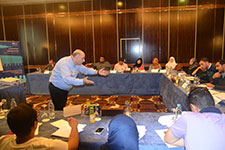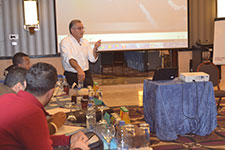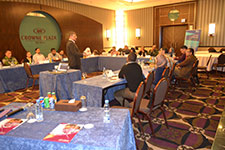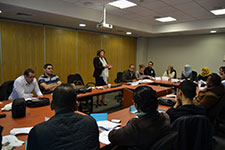- English
- عربي
News and Events
Week 2 Report
Summary of the second week of Leaders for Democracy (LFD) 2015 Program
by Mahmoud Mharmeh
The second week of the LDF program was filled with important and beneficial events which refined the participants’ character.
On the first day, Dr. Maha Yahya addressed the development of transitional policies in the Middle East. Dr. Yahya was first introduced by one of the participants who summarized her professional carrier. Then, the participants introduced themselves with a brief introduction of their personal activities and political orientation. Dr. Yahya started by addressing the most prominent milestones, most notable of which the outbreak of popular unrest in 2011 in Arab countries, the underlying reasons and the emerging movements in an ostensibly stable politi- cal, social and economic environment. Throughout the lecture, participants exhibited unprece- dented engagement and they all significantly contributed by giving their opinion about the latest developments in the Arab countries.
During the second lecture, Dr. Yahya presented the various aspects of injustice that stalked the Arab people on the eve of the uprising and their understanding of the people’s aims and aspirations for the future; and so did the participants in discussing their experience concerning the role of civil society and activists in bringing change to the Arab countries.
The third lecture was made by Mr. Elie Samia which was related to the experiment of the Arab League model and as usual, one of the participants gave a synopsis about the guest. Mr. Samia first presented and explained the LAU’s experiment in applying the LAS model, by training young men and women to train other youths and how this projects was met with great demand in Lebanon and some foreign countries; Mr. Samia also tackled the particularities of rehabilitating and conducting training for the youth.

All participants partook is posing questions and making inquiries about the project and ways to apply it to real-world situations and they role-played some practical exercises that are taught to the trainers of the project. The exercises were beneficial in terms of acquiring proper and useful listening skills.
On the second day, the lecture was made by the Dean, Elias Hanna on the geopolitical concept in the Middle East. The Dean started out by defining the term geopolitical and made a presentation on the history and importance of the Fertile Crescent throughout past years and he discussed the conflict over the Fertile Crescent for geopolitical reasons and international interests.
 He also discussed the importance of the Middle East and North Africa region; the history of the countries in the Middle East; the interests of western nations in the region; how each country is dealt with separately and the importance of the region in terms of history, politics and religion. The participants had numerous important and valuable questions.
He also discussed the importance of the Middle East and North Africa region; the history of the countries in the Middle East; the interests of western nations in the region; how each country is dealt with separately and the importance of the region in terms of history, politics and religion. The participants had numerous important and valuable questions.
Mr. Adnan Melki conducted the third lecture on elections and election monitoring. Mr. Melki explained the multiple electoral systems in Arab countries, the way elections take place in these countries and the electoral system in Lebanon and the Arab world; and how the Arab nations developed over the years in the field of elections, proportional representation lists and the distribution of seats in the various constituencies.
 He also talked about the various methods of election monitoring, the bodies that carry out election monitoring, the way assessments are made and disseminated as well as the problems faced by monitoring teams.
He also talked about the various methods of election monitoring, the bodies that carry out election monitoring, the way assessments are made and disseminated as well as the problems faced by monitoring teams.
The participants got very engaged and each gave a detailed explanation as to how the election process is carried out in their respective countries and they all asked questions and made inquiries about the modalities of election monitoring.
On Wednesday March 4th, the first and second lectures were conducted by Dr. Yezid Sayigh on political emancipation as Dr. Sayigh began by directing introductory questions to the partici- pants on whether the Arab governments were politically successful and whether democracy is the only tool to measure success. He also asked whether government policies were the reason behind the inability to attain the core goals of democracy.
The participants did partake in a civilized, democratic, wide and effective way in the session reflecting their strong capacity to analyze and express their opinion.
Dr. Sayigh also addressed the pressures of democratization and the economic failures of the 1980s and 1990s coupled with the fast paced population growth; how some Arab countries launched their democratic transformation process; how things progressed and the underlying reason for change in some Arab countries.
In addition, Dr. Sayigh tackled the financial crisis and its impact on the political system in several of the Arab countries. Dr. Sayigh talked about the reasons behind the Arab revolutions, their motives, inception and ending and the development of political Islam.
There was a great deal of engagement and participation on the part of the participants with differing views related to the various topics.
 On the fourth day, the participants took a field trip to Byblos (Main campus of the LAU) where Dr. Josiane Srih conducted three lectures on management and leadership in the business world by defining the term management, its components, success factors, innovative marketing methods, modern marketing strategies and their development. During the lecture, Dr. Josiane Srih presented a documentary on management, the skills of excellence, commodities market- ing and the success elements of a successful management.
On the fourth day, the participants took a field trip to Byblos (Main campus of the LAU) where Dr. Josiane Srih conducted three lectures on management and leadership in the business world by defining the term management, its components, success factors, innovative marketing methods, modern marketing strategies and their development. During the lecture, Dr. Josiane Srih presented a documentary on management, the skills of excellence, commodities market- ing and the success elements of a successful management.
The session was very engaging with positive participation and interaction.
On the fifth day, Dean Elias Hanna deliberated about power sharing, spread of wealth and the strife between states, denominations and communities in many of the Arab and foreign coun- tries over the course of the past years and the way it all developed. He drew comparisons between conflicts of the past and the present and he also talked about the policy of being different and the impediments to nations attaining stability and security.
The last lecture of the week was an opportunity for Mr. Elie Samia to discuss the model of the Arab League: he presented the reasons behind the success of the LAS simulation project as an educational and applicable curriculum and how it strengthens students’ awareness and under- standing. He also talked about student training through role-playing as part of the studies, research and skillful and proficient impersonation of a character.
Mr. Samia also highlighted how this project contributes to instilling culture, knowledge and interaction skills; the wide-spread of the project benefits; how it prepares young leadership that is self-confident; and capacity building.
All participants enriched the meeting and dialog through their participation.
